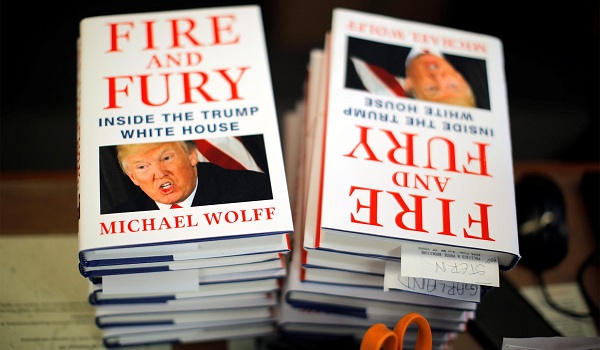Mainstream media outlets are still analyzing and focusing on Michael Wolff’s ‘Fire and Fury’ book, which details the behavior of US President Donald Trump and staff of his 2016 presidential campaign and White House.
The book reached the bestseller list and its full- text copy was tweeted by WikiLeaks.
It was based on about 200 interviews, according to the author of the book, who said that White House staff described the president as childlike because “he has the need for immediate gratification. It’s all about him… This man does not read, does not listen. He’s like a pinball just shooting off the sides.”
Wolf has spent three hours with Mr. Trump in total, both during the election campaign and after the inauguration.
“The President had no credibility and 100% of the people around him question his fitness for office,” the author said, according to the BBC.
The book deals with other facts, including that:
- The Trump team was shocked and horrified by his election win
- His wife, Melania, was in tears of sadness on election night
- Mr. Trump was angry that A-list stars had snubbed his inauguration
- The new president “found the White House to be vexing and even a little scary”
- His daughter, Ivanka, had a plan with her husband, Jared Kushner, that she would be “the first woman president”
- Ivanka Trump mocked her dad’s “comb-over” hairstyle and “often described the mechanics behind it to friends”
The book hits Trump where it hurts most
CNN reported five days ago that the book hits Trump where it hurts most. “Nothing means more to Donald Trump than his image…He got rich by selling his name, plastering it on buildings, hotels, casinos and golf resorts, and he transferred his tough guy “You’re fired” persona to politics, building a personality cult as an ultimate winner and tough-talking President”.
What fire and fury tells us about Trump’s foreign policy is terrifying, Vox website said yesterday.
“From bombing Syria to the surge in Afghanistan to the standoff with North Korea, Trump behaves largely as he did during the deliberations over whether to fire FBI director James Comey: ignoring the facts of the situation, making decisions rooted principally in his own personal feelings or connections, then failing to understand the consequences of his actions even after they’ve been taken.”
“If the Trump White House was as unsettling as any in American history,” Wolff writes, “the president’s views of foreign policy and the world at large were among its most random, uninformed, and seemingly capricious aspects.”
Trump’s foreign policy is terrifying
The foreign policy dominated and shaped by Trump’s personal peccadilloes rather than any kind of ideology or comprehensive worldview. It’s hard to imagine a person less well-suited to making foreign policy decisions than the Trump that appears in Wolff’s book.
The president is practically allergic to facts or being briefed on new situations. This became clear to Trump’s aides during the presidential transition, when he started to receive briefings from US intelligence.
“It was during Trump’s early intelligence briefings, held soon after he captured the nomination, that alarm signals first went off among his new campaign staff,” Wolff writes. “He seemed to lack the ability to take in third-party information.”
Trump also appears deeply reluctant to learn anything more about a given country or conflict. He has come to despise National Security Adviser H.R. McMaster, according to Wolff, because McMaster’s briefings are full of dry information about various global hotspots.
Trump’s collusion with Israel
MSM pundits have shown little interest in what the Electronic Intifada website has called ‘Israelgate’ coming out of the Wolff book.
Wolff recounts an early January 2017 dinner in New York where Bannon and disgraced former Fox News boss Roger Ailes discussed cabinet picks.
Bannon observed that they did not have a “deep bench,” but both men agreed the extremely pro-Israel neocon John Bolton would be a good pick for national security adviser. “He’s a bomb thrower,” Ailes said of Bolton, “and a strange little fucker. But you need him. Who else is good on Israel?”
“Day one we’re moving the US embassy to Jerusalem. Netanyahu’s all in,” Bannon said, adding that anti-Palestinian casino billionaire Sheldon Adelson was on board too.
“Let Jordan take the West Bank, let Egypt take Gaza. Let them deal with it. Or sink trying,” Bannon proposed. “The Saudis are on the brink, Egyptians are on brink, all scared to death of Persia.”
Asked by Ailes, “Does Donald know” the plan, Bannon reportedly just smiled.
Bannon’s idea reflected “the new Trump thinking” about the Middle East: “There are basically four players,” writes Wolff, “Israel, Egypt, Saudi Arabia and Iran. The first three can be united against the fourth.” Egypt and Saudi Arabia would be “given what they want” in respect to Iran, and in return would “pressure the Palestinians to make a deal.”
Another key foreign policy relationship for the Trump administration has been with Mohammad bin Salman, the reckless crown prince and real power in Saudi Arabia, who has been willing to go along with the plan, especially by cozying up to Israel.
According to Wolff, the lack of education of both Trump and MBS – as the Saudi prince is commonly known – put them on an “equal footing” and made them “oddly comfortable with each other.”
Trump, ignorant and constantly flattered by regional leaders, appeared to naively believe he could pull off what he called “the biggest breakthrough in Israel-Palestine negotiations ever.”
Moreover, Wolff’s book confirms that Trump’s presidency has helped revive the historic alliance between anti-Semites and Zionists to drive a far-right pro-Israel agenda.
Compiled by: Basma Qaddour

